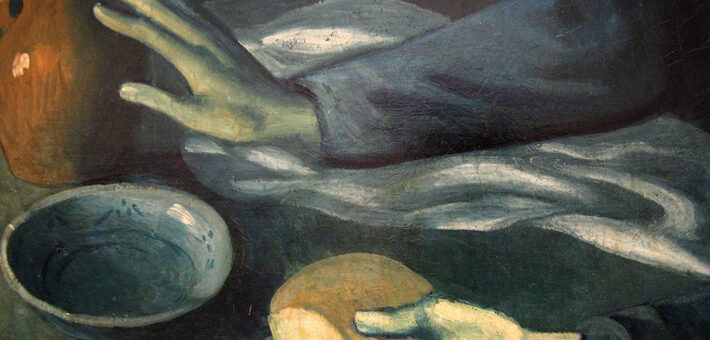Commentary on Proverbs 9:1-6
Proverbs 9:1-6 is an invitation to wisdom.
The invitation is given through a personification of wisdom as a woman who has built a house, prepared a life-giving meal, and invited all to partake. It is a simple passage at first glance, yet it contains riches in the description and in its connections to other places in the biblical witness.
Woman wisdom
Wisdom is first personified as a woman in Proverbs in 1:20-33; the personification is picked up again in 3:13-18 and 4:1-13. All of Proverbs 8, the chapter immediately preceding today’s passage, consists of the longest and most developed of the personifications. The basis for the particular personification of wisdom as a woman lies in the feminine gender of the Hebrew word for wisdom, hokmah. Interpreters have debated how the personification is to be interpreted, especially as wisdom is stated to be the first creation of God (8:22) and to be involved in the creation process itself (3:19). Is wisdom meant to be a specific aspect of God or even a separate being from God? Or should all such language be taken as mere metaphor? In today’s passage, however, such questions are not of direct relevance, as wisdom, while given a divine quality, refers to a way of living the human life.
The ways of wisdom and folly
The personification of wisdom in today’s passage is paired with a personification of foolishness in Proverbs 9:13-18, also as a woman. The similar structures of the two passages indicate that they are to be read together and in contrast. Both invite the “simple” into their houses for a meal, using the same invitation (vv. 4, 16). But while wisdom has gone so far as to build her own house, prepare her own meal, and to make efforts to invite people in, the foolish woman merely sits at the door of her house, calling to whoever happens to pass by (vv. 14-15), and her meals are stolen (v. 17). Moreover, while wisdom’s meal leads to life (v. 6), foolishness kills her guests (v. 18).
Wisdom’s feast
The description of wisdom’s meal paints a picture of a true feast in a lavish, even sacred setting. The opening verse states that she has built her own house and that this construction involved setting up “seven pillars.” Pillars would only be used in building a house of substantial size and quality, and the number seven implies some special character to the house. This perhaps is a reference to the mythic pillars of the foundation of the earth, especially as wisdom’s role in creation was emphasized in the passage preceding this one (Proverbs 8:22-31). The number may also suggest the pillars of a temple. Both ideas may indeed fit together, picking up the common scriptural idea of the whole earth as God’s temple.
The meal itself and the invitation likewise indicate the rich and open nature of the feast. Wisdom has slaughtered multiple animals and set a table (Proverbs 9:2), indicating that this meal will go beyond the everyday meals of the average Israelite (the typical meal for the average person in the ancient world did not involve meat). Bread and wine are also to be served (vv. 2, 5). Wisdom has servant girls — she is a woman of means, clearly — and she has sent them out to issue the invitation where all can hear it (v. 3). It is a rich feast, one to which all are invited.
Partaking of this feast leads to life (Proverbs9:6). The connection between wisdom and life is frequently made in Proverbs, often artfully so: “For whoever finds me finds life” (8:35a); “Long life is in her right hand…She is a tree of life to those who lay hold of her” (3:16a, 18a). To accept wisdom’s invitation is to embrace the life that God has designed for us.
Wisdom and Christian faith
A consideration of our passage in light of the broader witness of scripture enriches the passage yet further. There are two main ways the language of wisdom from Proverbs is found in the New Testament. First is the continuation of the wisdom tradition and teaching about wisdom, primarily in some of Jesus’ teaching (most notably the Sermon on the Mount) and in the book of James. “If any of you is lacking in wisdom,” James says, “ask God, who gives to all generously and ungrudgingly, and it will be given you” (James 1:5). James picks up on the Proverbs idea that God is the source of wisdom (e.g., Proverbs 2:6) and on the idea from our passage that wisdom is available to all. Shortly after our passage, we find the important saying, “The fear of the Lord is the beginning of wisdom, and the knowledge of the Holy One is insight” (9:10). The last line of our passage, then — “walk in the way of insight” — is first of all an admonition to follow God.
The second way we find wisdom in the New Testament is in the understanding of Christ. The connection between wisdom and creation in Proverbs is a significant part of the foundation for our understanding of Christ’s pre-existence and involvement in creation as it appears in the New Testament, seen especially in John 1:1-5, Colossians 1:15-20, and Hebrews 1:1-4. Paul declares that Christ is “the power of God and the wisdom of God” (1 Corinthians 1:24). Since Christ thus takes on the Proverbs role of wisdom, it is appropriate — perhaps even necessary — for us to see in our passage an admonition to follow Christ and a celebration of doing so. Hence, while neither the original author nor the original audience could have thought of the Lord’s Supper in the reference to bread and wine in v. 5, this description of the feast of wisdom can only enhance our own understanding when we partake of the elements. Jesus, after all, described life in the kingdom of God as a great feast on multiple occasions (e.g., Luke 13:29; 14:15-24; 22:29-30; Matthew 22:1-14). The invitation to eat wisdom’s feast in her house, therefore, can well be understood as an aspect of Jesus’ invitation to follow him and to feast in the kingdom of God.


August 16, 2015